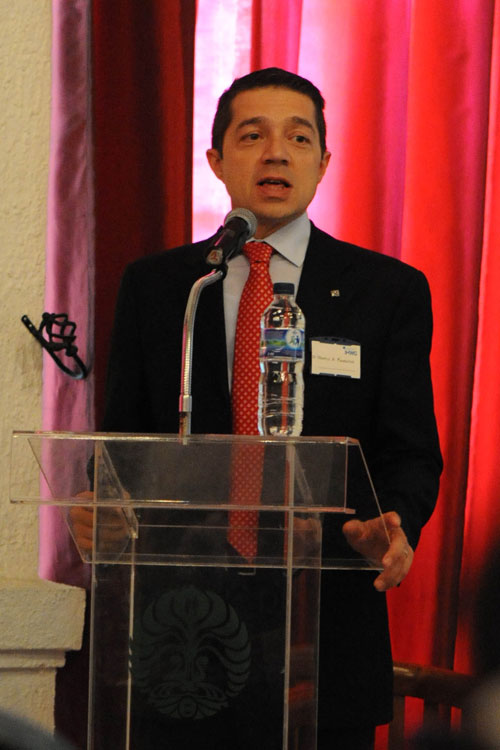
When a university in Indonesia launched the Indonesian Hydration Working Group, officials there wanted an international expert in hydration to speak at the inaugural event. University of Arkansas professor Stavros Kavouras had farther to travel since moving from his former home in Athens, Greece, but he accepted the invitation to go to Jakarta last month.
Kavouras, an assistant professor of exercise science began teaching and conducting research on the Fayetteville campus in August while continuing to make several international trips this semester, not only to promote his work in the areas of hydration and its relationship to heat-related illnesses and athletic performance, but also to promote his new university.
“I think this travel is important for the university; the name of the University of Arkansas is exposed in different places,” said Kavouras. A native of Greece, he earned degrees from the University of Athens, the University of Colorado and the University of Connecticut. He formerly taught at Harokopio University in Athens.
He has done extensive work in the area of hydration assessment; in other words, what physical health measures can be used to assess the hydration status of the body.
Kavouras delivered the keynote address at the inaugural ceremony in Indonesia, offering information about his research. Afterward, several people were interested in talking with him about that but also about Arkansas.
“I have noticed that American universities in general are very well-respected,” Kavouras said. He also taught a master class in the nutrition studies program at Universitas Indonesia while he was there.
Indonesia is a tropical nation of thousands of islands, Kavouras explained, so there is water everywhere but it’s not of good quality for drinking. Many Indonesians mostly drink bottled water, he said.
The vice minister of health for the Republic of Indonesia attended another conference at Gadjah Mada University, where Kavouras spoke a few days later. The nation announced a change in dietary recommendations to include an increase in the amount of water to drink for good health. Water is a critical, yet often overlooked, component of good health, Kavouras said, what he calls a forgotten nutrient. Even a mild degree of dehydration can have detrimental effects both on health and exercise performance, he said. Indonesian officials unveiled a pyramid-like graphic designed to educate people about the importance of drinking water.
Kavouras is scheduled to make a presentation in Brussels this week at a meeting of the International Life Sciences Institute on the topic of adequate methodologies for recording fluid and water intake. Kavouras will talk about consequences for assessing the hydration state, setting water adequate intakes and identifying at-risk groups.
Invitations such as the ones to Indonesia, Belgium and Cuba (the latter he didn’t accept because of visa complications) come through several channels, Kavouras said.
“They usually find me through the (research) literature,” he said.
He met several of the Indonesian Hydration Working Group officials at a conference last year in France.
Kavouras also goes to Turkey in a couple of weeks to speak at the FINA World Sports Medicine Congress, which is held each year in conjunction with the FINA World Swimming Championships. The events are held back-to-back so that coaches and scientific personnel with teams from all over the world can take advantage of the sports medicine presentations while there for the competition.
Kavouras was invited to the Istanbul meeting to “debate” another scientist about nutritional supplements. Kavouras takes the position that nutritional supplementation is essential for sporting success. He will also give a workshop about metabolic stimulation through dietary manipulation, or how changing what you eat can improve athletic performance.
An avid cyclist, Kavouras has framed photographs in his office in the Health, Physical Education and Recreation Building of himself with some famous faces, including Usain Bolt of Jamaica, regarded by many as the fastest man alive following his gold medals for sprinting in the London Olympics last summer.
Kavouras is also interested in future generations. He is studying whether there are differences between adults and children when it comes to hydration. Kavouras earned his doctorate in human exercise physiology from the University of Connecticut’s kinesiology department, the top-ranked kinesiology program in the United States for 10 years in a row. The National Academy of Kinesiology awards the rankings based on nine performance metrics involving faculty and seven measures involving students.
Kavouras’ mentor at UConn, Lawrence Armstrong, developed a urine color chart to help people assess their own hydration status. Kavouras is continuing to assist with a research project he started at Harokopio University to study the effectiveness of the color chart and other hydration assessments with children. He modified the color chart to make it simpler to read.
“There have been no studies done on whether children’s hydration control works like adults’ or asking whether kids understand how the chart works,” he said.
Graduate students in Athens are collecting data from 220 children for the research,
Kavouras said, and he expects to begin presenting the results next summer.
He’ll likely need to pack his bags again.
Topics
Contacts
Heidi Wells, director of communications
College of Education and Health Professions
479-575-3138,